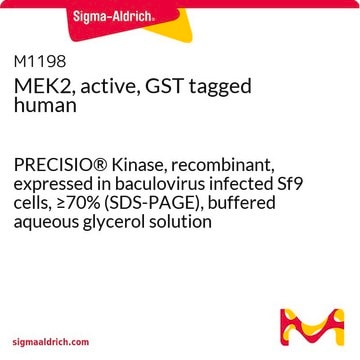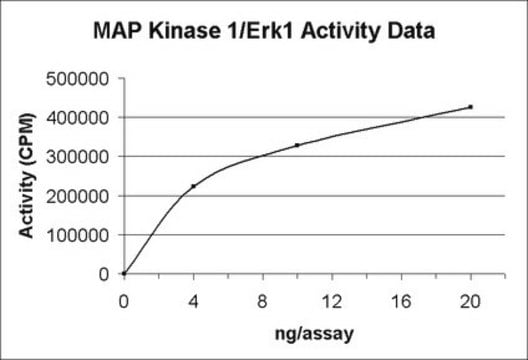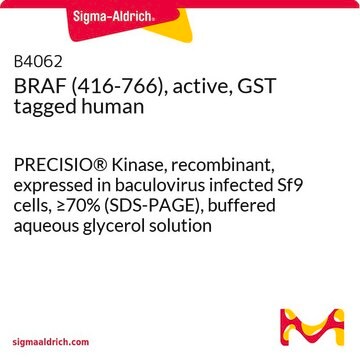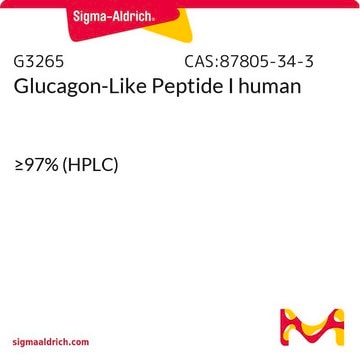M8822
MEK1, active, GST tagged human
PRECISIO® Kinase, recombinant, expressed in baculovirus infected Sf9 cells, ≥70% (SDS-PAGE), buffered aqueous glycerol solution
Synonym(s):
MAP2K1, MAPKK1, MKK1, PRKMK1
Sign Into View Organizational & Contract Pricing
All Photos(1)
About This Item
UNSPSC Code:
12352200
NACRES:
NA.32
Recommended Products
recombinant
expressed in baculovirus infected Sf9 cells
Quality Level
product line
PRECISIO® Kinase
Assay
≥70% (SDS-PAGE)
form
buffered aqueous glycerol solution
specific activity
276-374 nmol/min·mg
mol wt
~69 kDa
UniProt accession no.
shipped in
dry ice
storage temp.
−70°C
Gene Information
human ... Map2k1(26395)
General description
Mitogen activated protein kinase/ERK kinase (MEK)1 is a hydrophilic non-receptor protein and is a member of dual specificity protein kinase family. It is ubiquitously expressed. MAP2K1 is encoded by the gene mapped to human chromosome 15q22.31.
Application
MEK1, active, GST tagged human has been used to induce kinase reactions in in vitro mitogen activated protein kinase/ERK kinase (MEK)1 kinase assay. It has also been used to activate extracellular-signal-regulated kinase 2 (ERK2) by phosphorylation.
Biochem/physiol Actions
Mitogen activated protein kinase/ERK kinase (MEK)1/2 catalyzes the phosphorylation of tyrosine and then threonine in extracellular-signal-regulated kinase1/2. As an essential component of RAS−RAF−MEK−ERK signaling pathway (MAP kinase signaling cascade), it is involved in the regulation of apoptosis, cell cycle progression, cell migration, differentiation, metabolism, and proliferation. Constitutive activation of MEK1 results in cellular transformation. Thus, MEK1 represents a likely target for pharmacologic intervention in proliferative diseases such as cancer.
Physical form
Supplied in 50 mM Tris-HCl, pH 7.5, with 150 mM NaCl, 0.2 5mM DTT, 0.1 mM EGTA, 0.1 mM EDTA, 0.1 mM PMSF, and 25% glycerol.
Legal Information
PRECISIO is a registered trademark of Merck KGaA, Darmstadt, Germany
Storage Class Code
10 - Combustible liquids
WGK
WGK 1
Flash Point(F)
Not applicable
Flash Point(C)
Not applicable
Personal Protective Equipment
dust mask type N95 (US), Eyeshields, Gloves
Certificates of Analysis (COA)
Search for Certificates of Analysis (COA) by entering the products Lot/Batch Number. Lot and Batch Numbers can be found on a product’s label following the words ‘Lot’ or ‘Batch’.
Already Own This Product?
Find documentation for the products that you have recently purchased in the Document Library.
Hung Huynh et al.
BMC gastroenterology, 3, 19-19 (2003-08-09)
Hepatocellular carcinoma (HCC) is one of the most common malignancies in South East Asia. Although activation of the MEK-MAPK is often associated with cellular growth, the role of MEK-MAPK in growth and survival of hepatocarcinoma cells has not been established.
Pinar Oztas et al.
American journal of clinical dermatology, 8(2), 113-116 (2007-04-13)
Punctate palmoplantar keratoderma (PPPK) is a rare entity with an estimated prevalence rate of about 1.17 per 100,000. The exact etiology of the disorder is not known but a dual influence of genetic and environmental factors may trigger the disease.
Stefanie Galbán et al.
Molecular cancer therapeutics, 16(11), 2340-2350 (2017-08-05)
Responses to targeted therapies frequently are brief, with patients relapsing with drug-resistant tumors. For oncogenic MEK and BRAF inhibition, drug resistance commonly occurs through activation of PI3K/AKT/mTOR signaling and immune checkpoint modulation, providing a robust molecular target for concomitant therapy.
Clément Danis et al.
Journal of visualized experiments : JoVE, (118) (2017-01-07)
Aggregates of the neuronal Tau protein are found inside neurons of Alzheimer's disease patients. Development of the disease is accompanied by increased, abnormal phosphorylation of Tau. In the course of the molecular investigation of Tau functions and dysfunctions in the
Robert Roskoski
Biochemical and biophysical research communications, 417(1), 5-10 (2011-12-20)
MEK1 and MEK2 are related protein kinases that participate in the RAS-RAF-MEK-ERK signal transduction cascade. This cascade participates in the regulation of a large variety of processes including apoptosis, cell cycle progression, cell migration, differentiation, metabolism, and proliferation. Moreover, oncogenic
Our team of scientists has experience in all areas of research including Life Science, Material Science, Chemical Synthesis, Chromatography, Analytical and many others.
Contact Technical Service







